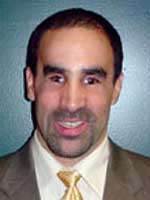
Commissioner
Matthew Sapolin:
Making a Difference for People with Disabilities
by Joan Baum,
Ph.D.
It’s as though October 20 were right around
the corner for Matthew P. Sapolin, Executive Director of the
Mayor’s Office for People with Disabilities (MOPD). With
a rush in his voice, an eagerness to note everything of importance
about how he and his staff are preparing for that day, the
commissioner is moving on all fronts. His office is partnering
that day with The American Association of People with Disabilities,
which has designated New York City as the national focus site
of Disability Mentoring Day. The event, for Sapolin, will mark
both a culmination of the “big three” activities
of his office—attention to housing, transportation and
employment needs—and a rededication of updated goals.
Though
Sapolin has been in his position for only a year and a half,
MOPD is 31 years old, having been established by then Mayor
Abraham Beame “to serve as a liaison between City government
and disabled individuals and organizations representing or
serving New Yorkers with disabilities.” In particular,
MOPD works to ensure that people with disabilities—approximately
56 million children and adults in the country—”are
considered in the development of City policies, programs,
and services.” That mission translates for the Commissioner
as serving the needs of the disabled by direct intervention,
collaboration with, and referral to, other agencies, and
promoting awareness, particularly about jobs—the emphasis
of Disability Day. According to national data, at least 70%
of persons with disabilities who are available for meaningful
work remain unemployed.
To achieve its goal
of bringing together mentors—local
employers and corporate leaders—and mentees—those
seeking full and part-time jobs and internships—MOPD
is mobilizing business leaders and alerting academic institutions
and the media. An April job fair held at the Pennsylvania Hotel
hosted 150 vendors and a “packed” house of job
seekers. A “tandem networking” event was held in
May, and on September 15 a Career Expo will be held in conjunction
with the Department of Youth Services and Community Development.
Not a placement agency MOPD’s main charge is to bring “awareness” to
a wide and diverse population. The Fortune 500 companies are
pretty knowledgeable about MOPD, Sapolin says, having put aside,
like J.P. Morgan Chase, special funding to attract persons
with disabilities. The challenge is to involve the smaller
businesses, “to let them know about the benefits of hiring
the disabled.” And of course, to let the disabled know
they have “voice and visibility” in his office,
an ironic phrase, perhaps, were it not for the fact that demonstrating
ability is what Matthew Sapolin himself is all about.
Only
in his mid-thirties, Sapolin brings with him years of experience
as co-executive director of the Queens Independent Living
Center, Coordinator of the Client Assistance Program for
the Center for Independence of the Disabled in New York,
and as a graduate of the Wagner School of Public Health Administration
at NYU. Blind since the age of five, Sapolin loses not a
nanosecond in zipping through computer files fishing for
information. Though he thinks it important that a disabled
person heads MOPD, he wants business in the city to hire
not disabled people but finance folks, people who are specialists
in human services, writers, computer experts—professionals
who happen to be disabled. A statement made recently by a
visiting attorney from Sydney, Australia sums up Sapolin’s
sentiments: “A city’s sophistication is best
judged by the manner in which it looks after the access issues
for its citizens with disabilities.” The Commissioner
is out to ensure that the City’s activities, institutions
and infrastructure not only “mirror our society,” but
project its best, most humane and civilizing values.#
For information
on Disability Mentoring Day and for a complete list of
publications call: (212) 788-2830 or visit www.nyc.gov/html/mopd.
